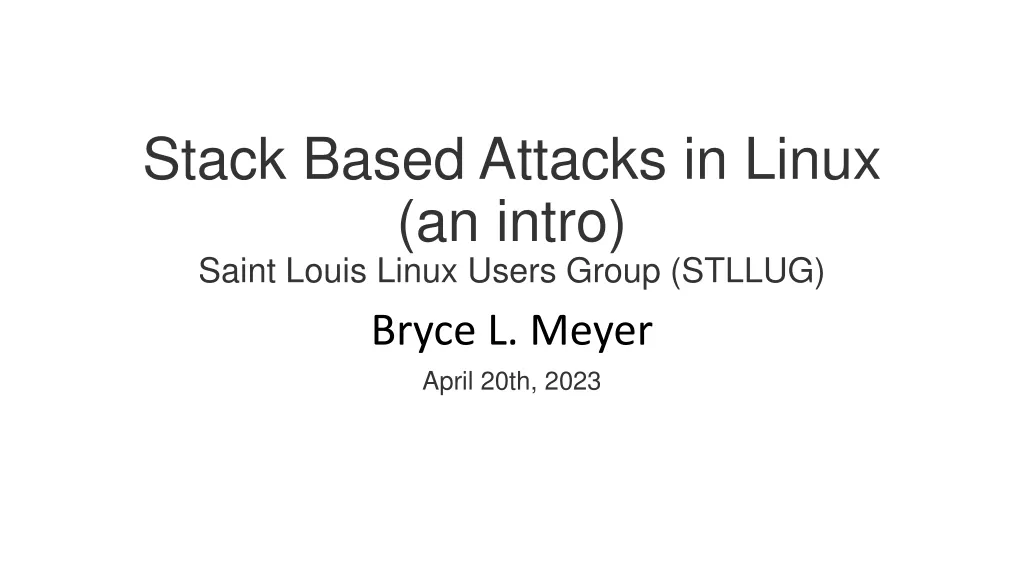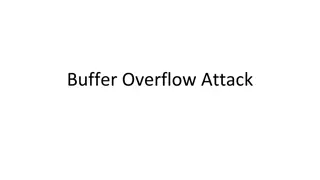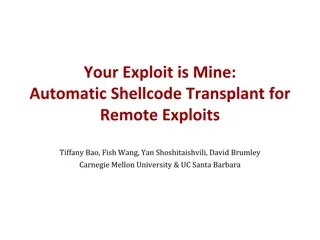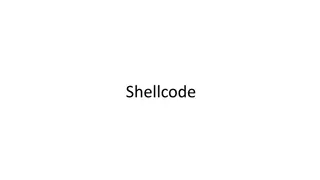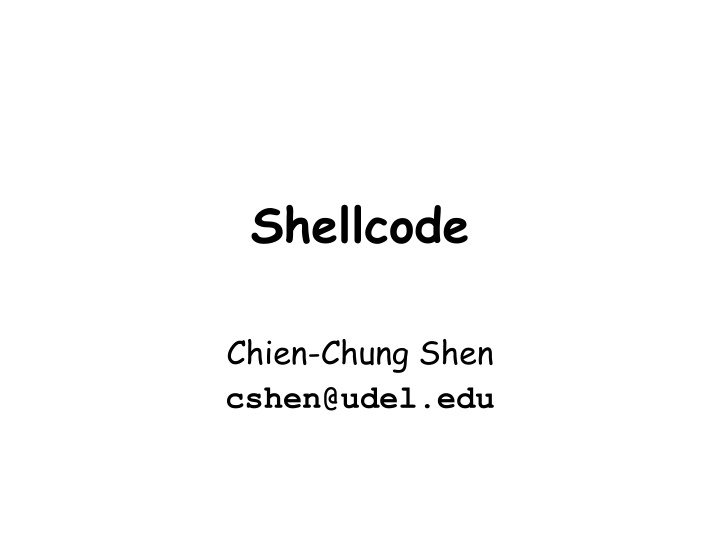
Shellcode Exploitation and Creation
Explore the basics of shellcode, a crucial part of software exploitation, along with types, creation methods, and execution using execve. Learn how to leverage local and remote shellcode for accessing systems and understand the intricacies of system calls for launching programs.
Download Presentation

Please find below an Image/Link to download the presentation.
The content on the website is provided AS IS for your information and personal use only. It may not be sold, licensed, or shared on other websites without obtaining consent from the author. If you encounter any issues during the download, it is possible that the publisher has removed the file from their server.
You are allowed to download the files provided on this website for personal or commercial use, subject to the condition that they are used lawfully. All files are the property of their respective owners.
The content on the website is provided AS IS for your information and personal use only. It may not be sold, licensed, or shared on other websites without obtaining consent from the author.
E N D
Presentation Transcript
Shellcode Chien-Chung Shen cshen@udel.edu
Introduction A a small piece of code, commonly written in machine code, used as the payload in the exploitation of a software vulnerability It is called shellcode because it typically starts a command shell from which the attacker can control the compromised machine The function of a payload is not limited to merely spawning a shell Types of shellcode: local and remote; depending on whether it gives an attacker control over the machine it runs on (local) or over another machine through a network (remote)
Types of Shellcode Local used by an attacker who has limited access to a machine but can exploit a vulnerability (e.g., buffer overflow) in a higher- privileged process on that machine if successfully executed, the shellcode will provide the attacker access to the machine with the same higher privileges as the targeted process Remote used when an attacker wants to target a vulnerable process running on another machine if successfully executed, the shellcode can provide the attacker access to the target machine across the network
execve Shellcode Create execve shellcode using the stack method to launch /bin/sh on Ubuntu 12.04 32-bit System call execve has system call number 11 #ifndef _ASM_X86_UNISTD_32_H #define _ASM_X86_UNISTD_32_H /* * This file contains the system call numbers. */ #define __NR_restart_syscall 0 #define __NR_exit 1 #define __NR_fork 2 #define __NR_read 3 #define __NR_write 4 #define __NR_open 5 #define __NR_close 6 #define __NR_waitpid 7 #define __NR_creat 8 #define __NR_link 9 #define __NR_unlink 10 #define __NR_execve 11 #define __NR_chdir 12 #define __NR_time 13 /usr/include/i386-linux-gnu/asm/unistd_32.h
Call execve in Shellcode Arguments of execve() EXECVE(2) Linux Programmer's Manual EXECVE(2) NAME execve - execute program SYNOPSIS #include <unistd.h> int execve(const char *filename, char *const argv[], char *const envp[]); filename: point to a string (/bin/sh) containing the path of the binary we want to execute argv[]: the list of arguments to the program ([/bin/sh, NULL]) envp[]: the list of environment options (NULL pointer)
Map CPU Registers for execve Call Registers eax, ebx, ecx, and edx are used for the system call using INT 0x80 In Linux, 0x80interrupt handler is the kernel, and is used to make system calls to the kernel by other programs The kernel is notified about which system call the program wants to make, by examining the value in the register %eax, which contains 11
Map CPU Registers for execve Call Pointer to null-terminated string /bin/sh NULL pointer Pointer to argv[]
Shellcoding in Assembly defined the TEXT section and let the entry point into this executable be _start
Shellcoding in Assembly setup the stack with all the arguments required for execve the stack for IA-32 grows from High memory to Low memory
Shellcoding in Assembly First, setup the EBX register for the 1st argument of execve() EBX needs to point to '\x0' terminated "/bin/sh" in memory We cannot do "PUSH 0x00000000" because Shellcode itself cannot contain NULLs (i.e., \x00) We will have to create 0x00000000 in one of the registers and PUSH the register onto the stack use XOR to zero out EAX and then PUSH EAX onto the stack
Shellcoding in Assembly Now PUSH string "/bin/sh" onto the Stack As the Stack grows from High memory to Low memory in x86, we will need to push "/bin/sh" in reverse order Also, it would be easier to push data which is a multiple of 4 with the least number of instructions "/bin/sh" is 7 bytes and we need to convert it to 8 bytes without messing up the filename On Linux, "/bin/sh" invokes the same program as "//bin/sh PUSH "//bin/sh" (8 bytes) in reverse order onto the Stack, i.e., "hs/nib//"
Shellcoding in Assembly PUSH "//bin/sh" (8 bytes) in reverse order onto the Stack, i.e., "hs/nib//" '//bin/sh'[::-1].encode('hex') '68732f6e69622f2f'
Shellcoding in Assembly make EBX (1st argument) to point to the top of the stack EBX is now contains the address of "//bin/sh" in memory
Shellcoding in Assembly setup EDX (3rd argument) which should point to a NULL pointer achieved by a PUSH EAX (remember EAX contains 0x00000000) and copying ESP into EDX
Shellcoding in Assembly ECX needs to contain the address of [Address of //bin/sh in memory, 0x0000000] Currently EBX contains the address of "//bin/sh" in memory so we PUSH EBX onto the stack the top of the Stack now points to [Address of //bin/sh in memory, 0x00000000], so we copy ESP into ECX
Shellcoding in Assembly All the arguments for execve() are now setup on the stack and EBX, ECX and EDX are pointing to them To call execve(), setup EAX to contain "11" and invoke Interrupt 0x80 http://www.tutorialspoint.com/assembly_programming/assembly_quick_guide.htm
Compile shellcode.c and Run It #include<stdio.h> #include<string.h> unsigned char code[] = \ "\x31\xc0\x50\x68\x6e\x2f\x73\x68\x68\x2\x2fx62\x69\x89\xe3\x50\x89\xe2\x53\x89\xe1\xb0\x0b\xcd\x80"; main() { printf("Shellcode Length: %d\n", strlen(code)); int (*ret)() = (int(*)())code; ret(); }

